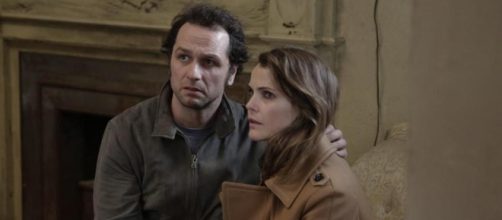The current season of “The Americans,” the FX Channel show about a pair of KGB Deep Cover agents living and spying in 1980s America, is proving to be among the most subversive television on the air, and in a good way. Slowly, with great deft, the show is demonstrating that the Cold War was not a fight between two soulless superpowers who were equally to blame for the conflict, but was a long, twilight struggled, to use a phrase spoken by JFK, between good and evil. Recent developments in the show have the main characters starting to wonder if they are on the wrong side.
The breaking point was the revelation in a recent episode that the agricultural firm that Philip and Elizabeth thought was testing pests to send against Soviet farms was, in fact, developing wheat that would resist such pests to feed the world. They had killed an innocent man based on an erroneous assumption.
Even the grizzled spymaster Gabriel, played with such studied restraint by Frank Langella, is so moved that he decides to retire and return home. Philip is further shattered by the revelation that his father was a guard in a labor camp and all that implies. Even Elizabeth, the staunch Soviet patriot and committed communist, is beginning to have her doubts.
No studies exist, at least publicly, about the long-term psychological effects of being in a foreign country on deep cover agents.
Intelligence organizations are not in the habit of releasing case studies of their spies. We get a hint, however, in “The Americans” of what it must have been like for Soviet citizens living as Americans in a country they have been taught was a murderous enemy. Many must start to realize that Americans, by and large, don’t want to kill Russians. They also must begin to recognize that life in the West is so much better than it is in the Soviet Union. The subversive nature of the show is that it depicts this fact. We are good. They really were the Evil Empire.
The most remarkable scene in the series thus far happens when Gabriel visits the Lincoln Memorial late at night. We know from a previous bit of dialogue that Gabriel admires the Great Emancipator.
He does not say a word, even as he turns to look at the Washington Monument across the Mall. What is he thinking? Perhaps how lucky America was to have two such men and to wonder why Russia was stuck with mass murderers like Lenin and Stalin. The realization must have broken the man who had spent his life serving the Evil Empire.

